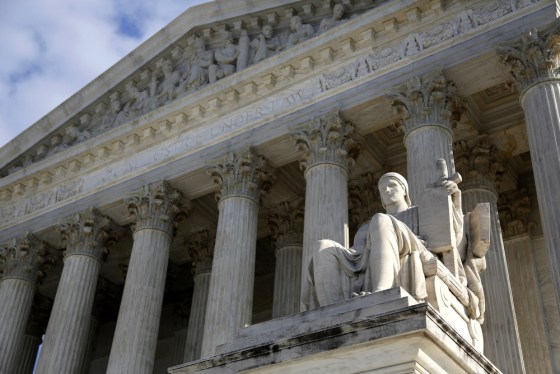The U.S. Supreme Court took up a legal dispute Monday between an airline pilot and his former employer whose suspicions caused him to be yanked off a flight home after failing a company test.
William Hoeper, an experienced pilot for Air Wisconsin, which operates commuter flights for US Airways, was ordered to get training to fly newer planes about a decade ago.
But in 2004, he failed several tests in an airplane simulator. He says he was set up to fail by colleagues who didn't like him. After the last session, he yelled at the instructor and was clearly upset.
"I said, 'This is ridiculous. You're railroading the situation. I'm going to go call my union.'"
Even though Air Wisconsin officials drove him to the airport and booked him a passenger seat on a United Airlines flight home, they later decided that he was so upset, he might be a threat and could be carrying the gun he was certified to have as a pilot.
So they notified the TSA that they were worried about his "mental stability" and that he might be armed.
As he waited for the plane to take off, federal agents came aboard and hustled him away.
"I was shocked," said Hoeper. "The first thing that was out of the (TSA) agent's mouth was, 'Have you been fired today? Where's your gun?'"
Hoeper sued, claiming the airline's statements were false. A jury in his home state of Colorado awarded him nearly $1.5 million dollars.
But Air Wisconsin, backed by other airlines, says it's protected from his lawsuit by a post-9/11 federal law that encourages reporting of air travel threats. It provides legal immunity, provided that the information isn't passed along maliciously or with knowledge that it's false.
"Airlines cannot carry out their role as an integral part of the multi-layered air transportation security system if they must fear that every statement to the authorities carries with it the possibility of a seven-figure damage award," says an industry group in a friend of court brief.
Jonathan Cohn, a Washington, D.C. lawyer who argued the case Monday for Air Wisconsin, said airlines are obligated to pass along information about potential threats.
"These reports are being made to TSA and other reasonable air safety officials for the purpose of passenger safety and aviation security. And TSA tells the airlines, if you have any doubt, report. If you see something, say something."
Still, some justices seemed sympathetic to Hoeper, expressing a belief that Air Wisconsin's statement about him was an exaggeration.
"What's so difficult about simply saying he's angry? Why choose the word 'mentally unstable?'" asked Sonia Sotomayor.
But several members of the court were clearly worried about discouraging airlines from reporting potential threats.
"If you're really concerned about enabling people to come forward when they have a suspicion about something," said Antonin Scalia, "letting a jury decide whether you put it wrongly or not doesn't make me happy."
And Stephen Breyer asked, "Why isn’t the best thing to say is, look, there is leeway here, considerable leeway on the part of the airline or anyone else who’s reporting" information to TSA.
While concerned that Air Wisconsin went overboard, the court seemed to be searching for a way to rule without discouraging other airlines from reporting behavior they find troubling.
The justices could send the case back to Colorado with instructions on how to apply the law, or they could rule for the airline.
A total victory for William Hoeper, however, appeared unlikely.
A decision is expected by late June.
